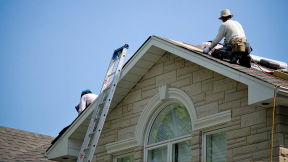How much do solar panels cost, and are they worth installing?

Installing solar panels is one of the ways you can potentially cut down on your utility bills, help increase your home's value and participate in sustainability initiatives. That said, many homeowners may need to weigh the costs and benefits when committing to such a substantial project.
What are solar home panels?
Let's start by specifying what a solar panel is. A solar panel is a device that collects energy from sunlight and generates it into electricity. When doing your research, you can also encounter the name photovoltaic (PV) panels, often used interchangeably.
Solar panels draw the attention of homeowners for a couple of reasons. They don’t pollute the air or emit carbon dioxide, which makes them a far more sustainable way to produce energy in comparison to fossil fuels, such as coal and gas. Solar panels may also help you save money on utility bills and potentially increase your home’s value if it's put on the market.
How do solar panels work?
When solar panels are exposed to sunlight, the material releases electrons and produces an electrical charge. However, only a certain portion of sunlight that hits a panel can be converted into electricity; this amount is calculated in percentages and is called solar panel efficiency. From the panels, a charge is forwarded to inverters, which change it into alternate current (AC) electricity, the type most used to power houses. Any excess energy can be stored in batteries or sent to the local power grid. Most commonly, solar home panels can be mounted on rooftops, though you can also install them on the ground or over a parking lot.
Different types of solar panels
The general concept of how solar panels can power your home is the same, no matter which solar system you use. However, there are three main types of solar panels you might choose from for your home:
- Monocrystalline panels: Each cell in the monocrystalline panel is produced from a single crystal of silicon. Due to this feature, this type of solar panel tends to be considered the highest-quality one. The efficiency of monocrystalline panels is in the range of 15-20%, and they usually come with a 25- or 30-year warranty. A drawback of these panels is the price — they are likely to be the most expensive option presented on the residential solar market.
- Polycrystalline panels: The cells for these panels are produced by the fusion of different silicon fragments. This allows the process to be more cost-effective, which results in a lower price for polycrystalline panels on the market. However, they are not as efficient as monocrystalline panels, falling in the range of 13% to 16%. The lifespan is slightly shorter as well, as polycrystalline panels will last you 20 to 35 years on average.
- Thin-film panels: In this type of panel, the semiconductor material is rolled out on the surface as a film. Because of this difference in manufacturing, thin-film panels are lighter and more flexible. On average, they are the least efficient compared to other options, but they could possibly be the cheapest. Since you need a larger number of panels to generate the same amount of energy, they take up more space. Overall, given their characteristics, you may not see them being used much for residential buildings.
The cost of solar panels
Before deciding whether you should commit to solar panel installation, you may want to calculate all the costs and see if it's a financially sound choice.
According to research, the pre-incentive cost of solar panel installation for an average-sized home is $25,000. This number does not include any rebates or financial incentives that are available for homeowners. However, the price of solar panels may vary significantly and be quite different for your house. If paying the whole sum upfront is too much, you could consider looking into solar loans or energy-efficient mortgages (EEM) that may help you finance the purchase.
Below, you can see what aspects to keep in mind when estimating how much a solar panel will cost in your case:
- Location: This has a significant influence on the average cost of solar panels. When calculating the cost, solar companies consider state tax incentives, solar power potential and the cost of electricity, among other factors.
- Your energy needs: The amount of energy consumed can be considerably different depending on the size of the home, household and overall habits. That's why professionals have to take this into account when determining the number (and cost) of solar panels.
- Country of manufacture: Currently, China is the leader in solar module production. In 2023, it manufactured 80% of global production. Just for that reason, China offers more options, including the less-expensive models.
- Material: As mentioned earlier, different types of panels fall into different price ranges. If you go with monocrystalline panels, they will be more expensive than polycrystalline or thin-film panels, on average.
Are solar panels worth it?
Generally, solar panels should save you more money than they cost. Usually, they pay for themselves slowly over several years, so think about your long-term plans and the impact solar panels could have on your bills. If you want to sell your home in the future, you may want to analyze your local real estate market since this enhancement may add value to your property and attract more potential homebuyers.
As with other sustainability-related topics, the monetary benefits are not all that’s worth considering. Solar panel installation may be an option for those who are trying to practice a more sustainable lifestyle, as solar energy does not create air emissions and is a renewable energy source.
Solar panel installation incentives
When trying to calculate the cost of installing solar panels, you should also look at different incentives and rebates offered to encourage homeowners to switch to renewable energy. There are benefits on the federal, state and local levels, so your exact savings and returns might depend on your location, as well as the amount of energy your system produces. Some of the most popular incentives to know include the federal solar tax credit, Solar Renewable Energy Credits (SREC) and local utility rebates, among others.
In summary
The cost of solar panels can differ significantly depending on your area, the size of your home and how much electricity you consume. However, installing solar panels may save you money in the long run and make your property more appealing to potential buyers in case you decide to sell. This article is for education purposes only, please refer to a professional for advice.
Solar panel FAQs
1. How long does it take to install solar panels?
The time to install solar panels for your home depends on the project's scope and weather conditions, among other details. Generally, it may take from less than one day to several days.
2. Will solar panels increase the value of my home?
Installing solar panels could possibly increase the value of your property if you decide to sell. Studies show that it can boost the home's value by $15,000 on average.
3. Can I install solar panels myself?
Yes, it is possible to install solar panels on your own. However, it requires some experience with electrical projects and more-than-basic tools. While cost-effective, this undertaking could be time-consuming and might void the manufacturer's warranty.
4. How can I finance my solar panel installation?
There are a few options to consider if you want to finance solar panels: You can apply for a dedicated solar loan, personal loan or home equity loan, just to name a few options. You could also consider a different approach and explore solar leasing or a solar power purchase agreement (PPA) to lower the upfront costs. Chase does not offer solar loans, personal loans, nor home equity loans.



